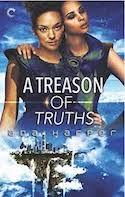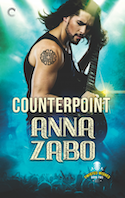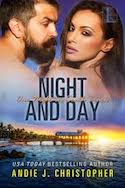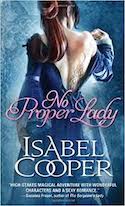Kissing Books: Emotional nutrition and narrative sustenance
Every month, Olivia Waite pulls back the covers, revealing the very best in new, and classic, romance. We're extending a hand to you. Won't you take it? And if you're still not sated, there's always the archives.
The difficulty with writing happy endings these days isn’t just that it takes more effort to imagine happiness. The challenge is that all of this feels so endless.
I write this at the height of the Kavanaugh nomination and its procedural chaos — but by the time you read it there will undoubtedly have been another crisis, another tipping point that has us shivering and shaking and shouting into our phones. Humans are a narrative species, and we use stories to make sense of what we see happening around us. Dr. Ford tearfully recalling the worst experience of her life — while dozens of white, old, thin-lipped men sat by unmoved — looked like the climactic setpiece from any courtroom procedural of the past thirty years, or the Dolores Umbridge/Ministry of Magic scenes from Harry Potter. Kavanaugh’s self-aggrieved tantrum was a high school thespian’s reenactment of Nicholson’s rage-induced breakdown in A Few Good Men. It is not that we reach for fiction because we are incapable of facing reality on its own terms: we look for these parallels because we desperately need to know what might happen next. So we can prepare for it.
But this administration gives us no respite and no resolution. Everything is nonsense; causes don’t recognize their effects. Kavanaugh was voted forward — or not? Pending an FBI investigation? — and it may have been something we helped make happen? Or not? Is Jeff Flake just three Ouija boards stacked in a trenchcoat, or has something meaningful been done to steer this travesty from its worst outcome? Meanwhile hundreds of immigrant children have yet to be returned to their anxious parents, Flint still doesn’t have clean water, gerrymandering and voter suppression are denying civil rights to millions, Puerto Rico still struggles to recover from last year’s hurricane, regulation rollbacks open parks to drilling and remove safety standards from the food chain, disability and medical bills bankrupt more people, police brutality against black Americans continues unchecked, the ACA is under open threat, the Mueller investigation is doing whatever it is the Mueller investigation is doing, the new federal budget slashes millions from Medicaid and Medicare, and so on and so on and so on. There are stories I’m forgetting or that I’ve missed. We can’t get a handle on everything because it’s too much, and we can’t disengage because so much of it is quite literally life or death stakes. It is a viral attack on the public consciousness, with intent to disarm and overwhelm.
The idea that a crisis could actually just be over feels like an old-fashioned luxury. They are using our capacity to care about one another as a weapon against us. It’s evil. I am so constantly furious about this it’s a wonder my hair has not turned into a tangle of hissing snakes.
Assailed by too many competing stories, we select narratives in self-defense. Women and survivors across my timelines are posting shots of Judith and Holofernes, Wonder Woman, Xena. We are going over the movies and media we watched in our youth — Sixteen Candles and Revenge of the Nerds have been name-checked time and again — to offer concrete, pre-understood examples of what we’ve experienced. We’re searching for better stories, for comfort: the number of posts I’ve seen asking for f/f romance recs has trebled, at least. I believe this is no small part of the momentum behind the new wave of romantic comedies we’re seeing across film and streaming services. People are looking for better answers at the same time as they’re looking for ways of feeling less hopeless, exhausted, and confused.
Romance novels bring moral clarity and resolution like it’s going out of style. Here are our heroes and heroines: they may not be the best people right now, but they’re going to get better. And then they’ll be rewarded. Their struggles will cease. We can and will argue all day about what kind of character can legitimately be set up as a hero or heroine (some authors just cannot resist a Nazi redemption arc, ugh) but we can’t argue about the skeleton underneath. At this point picking up a romance doesn’t feel escapist anymore — or else it’s escapist the way that it would be escapist to consume coleslaw or citrus on a long sea voyage to keep scurvy at bay. More than anything, romance novels make it safe and rewarding to care about the characters you meet. Emotional nutrition. Narrative sustenance. There is something we need to thrive, and the cultural environment is deliberately denying it: we have to look for it elsewhere. Even the dinosaurs in Jurassic Park found ways to get around the lysine contingency meant to keep them captive. (You can picture me as a Velociraptor sniffing at the door, tapping my talons thoughtfully as I stalk the shadowed aisles of an industrial kitchen.)
This month’s column brings you two queer romances, two feminist historical novellas, a Miami-set contemporary, and a creepy little masterpiece where a Victorian magician falls in love with a futuristic assassin of eldritch horrors. Pick your poison. Take your medicine. Rest a little, then get back up and show these fuckers how strong we really are.
Recent Romances:

A Treason of Truths by Ada Harper (Carina Press: science fiction f/f)
Sci-fi romance is one of the hardest genre blends to get right. It requires the emotional arc between the protagonists to be as fully fleshed-out as the speculative twists of the plot. But when it’s done well it feels more complete than either genre alone: richer than technofiction, and more transportive than real-world romance. I’ve seen it done well before, but I’ve rarely seen it done this well, and damn if I’m not a little awed. A Treason of Truths is the sequel to the complex and gripping A Conspiracy of Whispers, and unlike most romance series these should definitely be read in proper order. The first book sets up the players and politics of Harper’s futuristic post-Crisis world — while giving us a sizzling romance between an Imperial prince and a prickly assassin from the dystopia next door — and this second book comes along to revel in the consequences. The fun of high-tech espionage, shady moral politics, and one of the best takes I’ve seen on the Fated Mates trope make these books an experience that shouldn’t be missed.
Empires live and die on the trading of secrets, and the family-bloodline-focused, gilt-plated Quillian Empire’s greatest spy is Lyre (aka the Liar, if you’re nasty). But Lyre has unsuspected secrets of her own: one, that she’s a rogue runaway from the floating Cloud Vault, a city-sized hoard of pre-Crisis knowledge and self-appointed technocrats who mostly steer clear of earthbound politics; two, that she’s helplessly, painfully, and irrevocably in love with the empress she serves.
Empress Sabine lost an eye in a failed coup attempt supported by a rival government — um, spoilers for book one — but it doesn’t take two eyes to see a trap when the Cloud Vault unusually offers to host peace negotiations. What follows is a stunning series of threats, rescues, escapes, betrayals, and revelations aboard a shining, tarnished and utterly creepy floating ship-city. Nanobots poison the bloodstream and turn people’s own bodies against them, mechanical moths scan every pipeline and passage for runaways, and eerie nightsbane-wolf crosses lurk in the shadows of the city’s forgotten underworld. All this plus a brutal, angst-filled, heart-twisting romance between two stubborn, wary, complicated women who can deceive everyone but one another.
If there is a book three someday I will shout my delight to the heavens.
A declaration — of need, of more than a need, of feeling — no, that was never supposed to be in the cards, but Lyre was a professional. She could cut her heart out for the game. She’d done it before. Working in intelligence meant carrying your own homeland inside you, soil to absorb it all until you could bleed in private. She’d thought she could control the reaction.

Counterpoint by Anna Zabo (Carina Press: contemporary m/pan m):
The real fantasy in romance is someone who sees you, and wants you, and loves you as you are. This fantasy has double the power in queer romance, which because of our culture has to traffic in a certain amount of invisibility. KJ Charles and Cat Sebastian’s m/m historicals make clear the risk a hero takes even in expressing interest in another man. Making queer desire visible can be fatal. Mx Zabo’s contemporaries deal in other kinds of erasure, within modern queer culture as well as around it: mental illness, kink and queer stereotypes, asexuality, public versus private personas. They have a glorious way of bringing to life the delicate give and take of a good seduction. Everything is carefully, thoughtfully, beautifully done — and all the hotter because of that. Of course, it helps that this series’ brand of kink is the cerebral, generous, ropes-and-leather command-and-obey kind (my favorite!) rather than the sadistic dungeon-full-of-spikes-and-whips kind. Give me a caring top who can dominate in a daytime hipster café with nothing but a piece of lemon meringue on a fork, and I’m one happy camper.
Domino Grinder is the guitarist for Twisted Wishes, a rock band on the upswing after an eventful whirlwind tour (shown in Mx Zabo’s excellent Syncopation). He curates the tattooed, spike-collared, bad-boy image carefully to protect his other self: shy, bookish, and submissive Dominic Bradley, who likes to put on bow ties and sweater-vests and cruise for handsome intellectual types. Such a man is pansexual programmer Adrian Doran, who knows lovely, expressive, wide-eyed, tie-me-up-please Dominic is just the kind of man he could fall for, and hard. But Dom is profoundly hesitant to reveal his other existence as Domino: not only because it’s a closely-guarded secret he fears will be leaked to the media, and not only because he thinks dommy Adrian would have no interest in brash, cocky, surly Domino (wrong! the reader wails internally). Mostly because Dom doesn’t know whether Dominic or Domino is the real one, his authentic self. For his part Adrian is dealing with being undermined and having his work essentially stolen by a newer, bro-ier programmer, and is in really no place to navigate a lover keeping a very big, very hurtful secret. This is the story of two complicated men who want and need each other desperately, and who are painfully careful and anxious about taking each step forward. Watching all the internal and external threads unspool, knots together, and ultimately release is an absolute pleasure.
“I’m in way over my head.”
“Shh.”
Adrian’s brow furrowed.
“So am I.” Dom closed his eyes. Oh fucking hell. He was gonna fall in love with Adrian. After two damn dates. That wasn’t safe and it wasn’t fair at all.

Miss Brodie’s Academy for Exceptional Young Ladies by Theresa Romain and Shana Galen (self-published: two historical m/f novellas):
Second-chance romance is a tricksy thing at novella length. On the one hand it lets us skip all the problem parts of the relationship and get right to the reconciliation. On the other hand…it lets us skip all the problem parts of the relationship, which is often where a lot of the tension and drama and heart-twisting feelings are generated. This volume features a pair of novellas in the quintessential modern Regency style, where a strong woman has carved out a feminist space within an overtly patriarchal world. Both are connected to the worlds of each author’s existing series — but only one left me wanting to explore more.
Shana Galen’s “Counterfeit Scandal” is a spy story without any spying, whose plot shows us neither counterfeiting nor a scandal. Hero Caleb worked for the Foreign Office during the Napoleonic Wars, embedded in a high position with the French army. He wreaked so much havoc that there is still a price on his head, so he lives quietly in a boarding-house in London. Heroine Bridget learned she was pregnant (!), married someone else (!!), and ended up in debtor’s prison (!!!) after the Foreign Office told her Caleb had died abroad (!!!!). Now she teaches art and forgery at an exclusive and very unusual academy. The two reunite by happenstance as Bridget searches for their son, who is somewhere in one of London’s many orphanages. Unfortunately, it’s clear we are watching this couple most closely at the least eventful part of their lives. Both the earlier Napoleon-and-debtor’s-prison sections or the reunited family’s sailing voyage to Canada seem like they’d have been stronger story fodder. (Imagine being on a long sailing voyage with your ex who you thought was dead, and the young son who only barely remembers you. And you have to pretend to be a happy family!) It made me wonder if there were just things I’d missed as someone who hasn’t read the author’s other books: there was a ghostly sense of weights and meanings that I ought to have felt in certain scenes, like hearing an inside joke where you don’t understand the reference.
Perhaps the unreality if the second story wouldn’t have felt so jarring if the first story hadn’t been so inviting and grounded and vivid. Theresa Romain’s “The Way to a Gentleman’s Heart” features academy cook Marianne Redfern as a heroine, and we’re treated to a bevy of concrete, anchoring details about recipes, cooking prep, budgeting, grocery shopping, and staffing issues. The crisis of how to plan a banquet when you’re understaffed feels more urgent than any of the vague espionage of the second novella. Food is one of the most irresistible things in fiction; it always means something culturally or emotionally or politically, so this story feels full of hooks that snag the heart. At one point hero Jack Grahame scours London’s markets to bring Marianne fresh honeycomb, just like they used to share as country lovers in years past. I just about swooned myself into a puddle on the floor, and it’s a great example of using a shorter story to give new readers a view into an established world. I wanted to move in at once, and order dinner.
He’d always liked her eyes. In a face as calm as any cameo painting, her changeable eyes had betrayed her true feelings. If he read their green depths correctly now, he’d caught her by surprise, and she wanted to flay him alive.

Night and Day by Andie J Christopher (Lyrical Press: contemporary m/f):
After the uncommon stress of the past few weeks, who’d have thought I’d enjoy a romance so much when it steers hard into questions of workplace affairs, abusive parents, and domestic violence? But such is the magic of a talented author: I was entranced.
Letty Gonzalez is hurt, angry, and desperate for a job: her art-festival-running ex dumped her and fired her when it turned out he couldn’t use her to access the family fortune. He also told her she was too fat for him to love, which tied in horribly to her issues with her fat-shaming mom and supermodel sister. Max Delgado is a grumpy sculptor with a simmering temper always on the verge of boiling over. He’s closed himself off for fear of becoming too much like his abusive father, and he’s only really able to express himself by heating and bending metal into abstract shapes. He also has a meddlesome, delightfully frank matchmaking grandma who I loved to pieces: Grandma Lola has decided Letty and Max would suit perfectly, so she fakes an email from Max hiring Letty as an assistant.
Letty shows up on the day Max is expecting a model for a sitting, so first thing right off the bat he demands she remove her clothes. And we’re off!
So many things in this book are messy: anger, pain, lust, fear, dysfunctional families. Letty’s wary of getting involved with another one of her bosses. Max is wary of losing control and hurting a woman he cares about. But the chemistry is stupid hot — and very palpable in the text, so it feels like a real problem and not a plot excuse — so even when both characters are just balls of electric insecurities, you’re rooting for them to figure it out and get back into bed already. Letty deserves orgasms! Max is ready to provide! She desperately needs to take care of someone, and he very much needs caring for! And the sexy bits are some of the most glorious filth I’ve read in a while: juicy, bawdy, slippery good fun. At the same time, the book puts the consent-and-power-dynamics questions of workplace harassment front and center, which is to say: how do you trust this motherfucker not to turn into a motherfucker like the last one? Consent is negotiated, offered, and withdrawn; boundaries are crossed, rethought, and reestablished. At the end of the book, after so many huge feelings and fuck-ups, I felt cleansed, wrung out, and excited about where our couple ended up. This was my first Andie J Christopher, but I promise you it’s not going to be my last.
When she brought the cups into the living room, she caught the tail end of Lola saying something like, “I didn’t come all the way over to Coconut Grove to watch you fuck this up.”
This Month’s Time-Travelling, Eldritch Horror-Slaying Heroine With A Gun Fueled by Her Own Blood And Incandescent Rage

No Proper Lady by Isabel Cooper (Sourcebooks: historical paranormal m/f):
This book was once pitched to me as Terminator meets My Fair Lady, and if you’re not already leaping for the buy button I don’t even know what we’re doing here.
Listen, there are just times when the most relatable heroine around is a gritty, wounded, half-starved, relentless assassin who has given up everything to come back in time and kill history’s greatest villain. Joan, daughter of Arthur and Leia, is humankind’s last hope. She has been sent back from the year 2188, a time when amorphous tentacular demons have taken over the earth and humanity’s remnants cower underground in the hope of surviving just one more muddy, miserable, sunless day. The man who started this all is Alex Reynell, a Victorian-era magician who possessed a book that let him open the doors to the demon world, destroying Earth and nearly everyone on it.
Joan of course has come to kill him. But first she has to find him.
She lands on the estate of magician Simon Grenville, who offers her shelter after she saves his life. Simon happens to be a former friend of Reynell, at least until Reynell started studying some of the really icky dark magics, so as Simon comes to believe Joan’s outlandish tale the two try to come up with ways to get Joan near Alex. Reynell moves in the highest circles of society — so naturally Joan has to learn to blend in with the aristocrats, which is where the My Fair Lady bit comes in. Meanwhile Joan is having a hard time adjusting to a world where gender roles are rigid but there is a shocking abundance of food and air and sunlight; she also painfully mourns the loss of her family, since it will be impossible for her to return to the future. Assuming it even exists once she’s done her job, that she doesn’t just wink out of existence as the last scrap of paradox. This book is darkly hopeful. This book is eerie. This book is one of the best fantasy romances I’ve ever read, and I cannot recommend it highly enough this Halloween season.
“Women are people,” she said calmly and cheerfully. “People are bastards. And someone who’s caged — no matter how pretty the bars are — is going to get bored and restless and go for the only entertainment she can. Even if that’s catching men.”